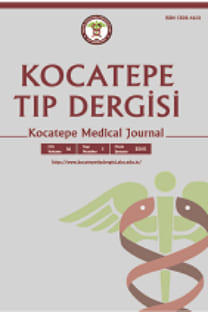Kolorektal Kanser Nedeniyle Opere Ettiğimiz Hastaların Değerlendirilmesi
Kolorektal kanser, yaş, cerrahi tedavi, Keywords: Colorectal cancer, age, surgical treatment, tumor tümör evresi, komplikasyon, tarama programı
The Evaluation of Patients Operated Due to Colorectal Cancer Kolorektal Kanserler / Colorectal Cancers
Colorectal cancer, age, surgical treatment, tumor stage, complication, scanning program,
___
- Eddy DM. Screening for colorectal cancer. Ann Intern Med 1990;113(5):373-84.
- Parkin DM, Pisani P, Ferlay J. Global cancer statistics. CA Cancer J Clin 1999;49(1):33-64.
- Değertekin H, Sarı Y, Arslan A, Akgül Y, Büyükbay- ram H. Age and sex distribution of colorectal carci- noma in the southeast of Turkey. The Turkish Journal of Gastroenterology 1999;10(2):153-6.
- Winawer SJ, Sherlock P. Best practice and research clinical gastroenterology. Colorectal cancer screening.Best Pract Res Clin Gastroenterol2007;21(6):1031.
- Ashktorab H, Nouraie M, Hosseinkhah F. A 50-year review of colorectal cancer in African Americans: implications for prevention and treatment. Dig Dis Sci 2009;54(9):1985-90.
- Parkin DM, Bray F, Ferlay J, Pisani P. Global cancer statistics, 2002. CA CancerJ Clin2005;55(2):74-108.
- Popkin BM. The nutrition transition inlow- income countries: an emerging crisis. Nutr Rev1994;52(9):285-98.
- Tözün N, Şimşek H, Özkan H, Şimşek İ, Gören A(Editörler).Klinik gastoenteroloji ve hepatoloji. Kolorektal polipler ve polipozis sendromları. Medikal ve Nobel Yayıncılık, 2007:963-70.
- Dolar E(Editör). Kolorektal tümörler. Nobel ve Güneş Yayınları, 2005:400-8.
- Boulton-Jones JR, Gamble S. Robinson MH, Keighley MRB, Williams NS(Editors.) Surgery of the anus,rectum&colon. 2nd Edition, London: WB Goddard WP, Long RG, Teahon K. The impact epidemiology, aetiology, pathology, staging, of the two-week wait scheme for suspected gastrointestinal cancer. Clin Med 2003;3(5):483-4.
- Flasman K, O’leary DP, Senapati A, Thompson Elsevier, 2008:1348-432.
- MR. The department of health’s two week standart and rectum.18th Edition,Philadelphia: Saunders for bowel cancer: is it working? Gut 2004;53(3):387
- Beauchamp RD, Evers BM, Mattox KL. (Editors). Colon Sabiston textbook of surgery. In: Townsend CM, Compton CC. Colorectal carcinoma: diagnostic, prognostic, and molecular features. Mod Pathol 2003;16(4):376-88.
- Kemeny N, Niedzwiecki D, Shurgot MS, Oderman N, Peveretos P. Site distribution of carsinoma of the large intestine: a retrospective study of 600 cases. Dis Colon Rectum 1989;32(1):14-6.
- RN. Prognostic variables patients with hepatic metastases from colorectal cancer. Importance of medical assessment of liver involvement. Cancer 1989;63(4):742-7.
- Kemppainen M, Raiha I, Rajala T,Sourander L. Delay in diagnosis of colorectal cancerin elderly patients. Age and Ageing 1993;22(4):260-5.
- WhitefordM. Early complications in colorectal surgery ASCRS core subject, Annual Scientific Meeting 2009.
- Karanjia ND, Corder AP, Beam P, Heald RJ. does colorectal cancer present? symptoms, duration, and clues to location. Am J Gastroenterol 1999;94(10):3039-45.
- Leakage from stapled low anastomosis after total mesorectal excision for carcinoma of the rectum. Br J Surg 1994;81(8):1224-6.
- Hawley PR, Ritchie JK. Complications of ileostomy and colostomy following excisional surgery. Clin Gastroenterol 1979;8(2):403-15.
- Menteş BB, Ege B, Üner A, Ünsal D, Yüksel O, Bostancı H, Oğuz M. Kolorektal kanserlerin tedavi sonuçları: tek merkezli, 200 vakalık seri. Gazi Tıp Dergisi 2007;18(3):97-103.
- Siegel R, Naishadham D, Jemal A. Cancer Statistics, 2012. CA Cancer J Clin 2012;62(1):10-29.
- Sağlık Bakanlığı Kanserle Savaş Dairesi Başkanlığı 2006-2008 yılları Türkiye kanser insidansı. www. kanser.gov.tr. Erişim: (28.12.2013)
- Gürsu RU, Kesmezacar Ö, Karaçetin D, Mermut Ö, B. Ökten, Güner Şİ. İstanbul Eğitim ve Araştırma Hastanesi Onkoloji Birimi: yeni kurulan bir ünitenin 18 aylık sonuçları. Istanbul Med J 2012;13(1):13-8. Saunders Company, 1999:998-1061.
- Gordon PH. Malignant neoplasms of the colon. In: Gordon PH, Nivatvongs S (Editors.) Principles and practice of surgery fort he colon, rectum and anus. 3rd Edition,Informa Healthcare USA Inc, 2007:489- 6
- Wei EK, Giovannucci E, Wu K. Comparison of risk factors for colon and rectal cancer. Int J Cancer 2004;108(3):433.
- Burt RW, DiSario JA, Cannon-Albright L. Genetics of colon cancer: impact of inheritance on colon cancer risk. Annu Rev Med 1995;46(1):371-9 108
- ISSN: 1302-4612
- Yayın Aralığı: Yılda 4 Sayı
- Başlangıç: 1999
Romatizmal Hastalıklarda Tamamlayıcı ve Alternatif Tıp Yöntemlerine Başvuru
Özlem SOLAK, Alper Murat ULAŞLI, Halime ÇEVİK, Aylin DİKİCİ, Gül DEVRİMSEL, Esra ERKOL İNAL, Nilgün ÜSTÜN, Selma EROĞLU, Hasan TOKTAŞ, Ümit DÜNDAR
Kolorektal Kanser Nedeniyle Opere Ettiğimiz Hastaların Değerlendirilmesi
İbrahim AYDIN, İbrahim ŞEHİTOĞLU, Ender ÖZER, Ahmet Fikret YÜCEL, Ahmet PERGEL, Recep BEDİR, Hasan GÜÇER, Dursun Ali ŞAHİN
Evlerdeki Gizli Tehlike; Turşu Kur İçmeye Bağlı Özofagus Korozyonu
Ahmet TUNCER, Afra KARAVELİOĞLU, Altınay BAYRAKTAROĞLU, Didem BASKIN EMBLETON
Kemikte Metastatik Nazofarenks Karsinomunun Aspirasyon Sitolojisi ve Hücre Bloğu Bulguları
Fatma SÖNMEZ, Osman YILMAZ, Hacı ESEN, Z. Esin ÇELİK
Fatih TEMİZTÜRK, Şule TEMİZTÜRK, Yasemin ÖZKAN, M. Hayri ÖZGÜZEL
Nagihan POLAT, Yüksel ELA, Serdar KOKULU, Elif BAKİ, Sezgin YILMAZ, Remziye SIVACI
